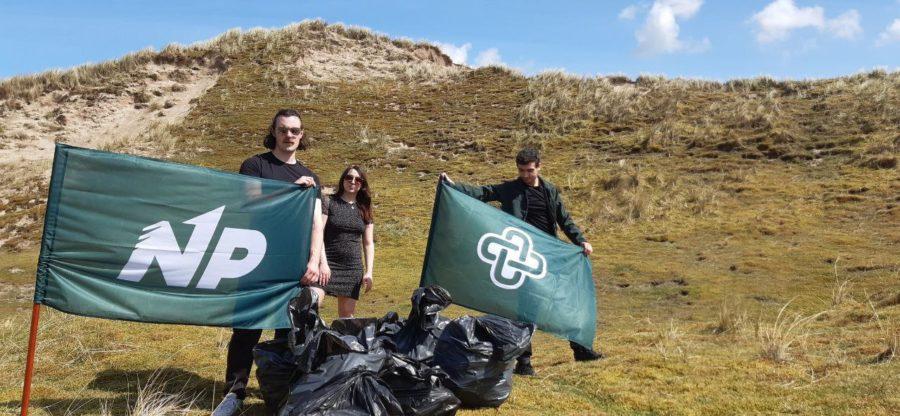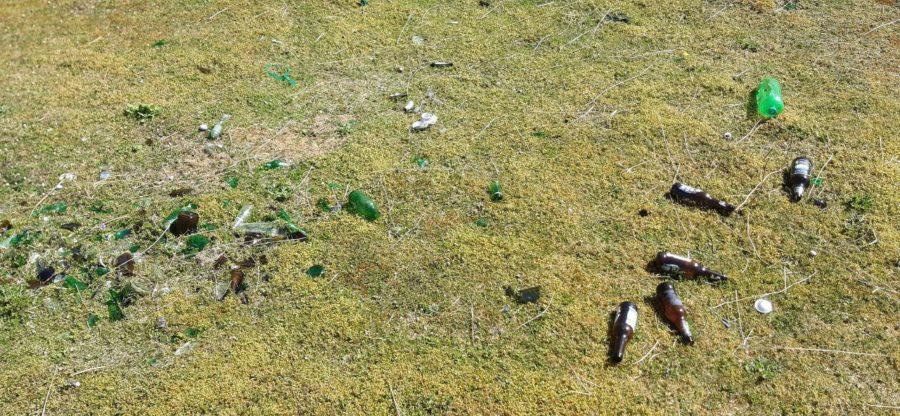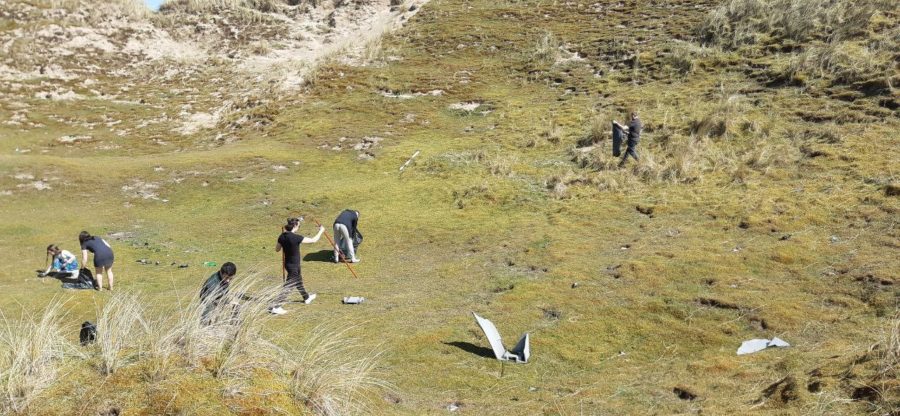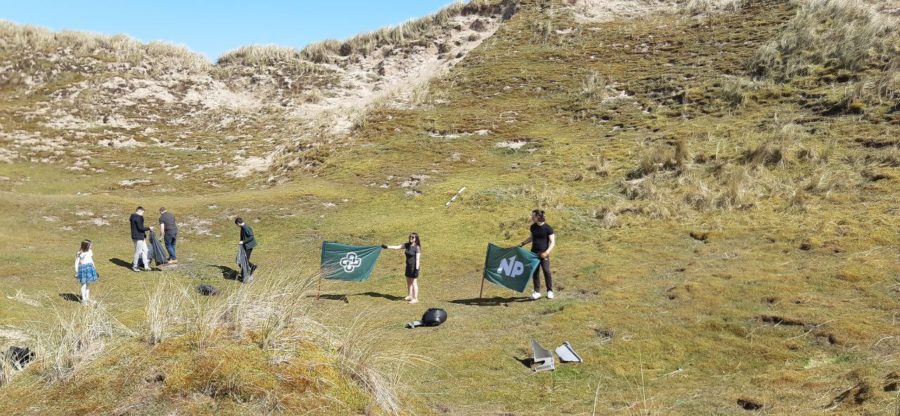
On a recent trek in the sandhills of Donegal, some local National Party members came across an area which was badly littered. There were not only cans and bottles scattered around but a significant amount of broken glass. Party colleagues were notified and a team was organised to go and clean the litter and debris. The cumann members worked together for a number of hours, leaving the area in a much better state than they found it in.
The strong sense of duty and responsibility that all involved felt was extremely commendable. As one of our activists put it, “For me Nationalism is not just a political position, aimed at getting into political office but reflects the way in which you view your country, how you regard your role and purpose in life. Our land is part of us and we are part of it.”
Nationalism and environmentalism must go hand in hand. For many years now there has been a drive to disconnect people from the soil and as a consequence make us all more dependent on state and corporate supply chains. The mainstream “environmental movement” is dominated by groups and individuals who are in a real sense anti-Nature. Their goals, even when admirable, are polluted by broader economic and cultural agendas that have little to do with sustainable environmental objectives. The inherent prejudice which many “green” activists feel for independent rural communities, cannot be separated from their ideological project. Their determination to uproot rooted identity and transform every aspect of human life is marked above all by hubris. They seek to impose an abstract technocratic solution not only to the natural world but to the “problem”, as they see it, of mankind. What they are engaged in is an inversion of reality. Their policies are to drive us from the land and to disconnect us from the soil.
There is naturally a strong resentment towards these policies by the communities most directly affected. Ordinary people who feel they are being steamrolled by remote, unfeeling technocrats. It is not helped by the contradictions and hypocrisies which so often arise, such as the fact that multinational data centres are now consuming more electricity than all of rural Ireland. Climate Action is convenient when it dovetails with the long-term systemic goals of mercantile liberalism, e.g. the breaking of rural independence, the smashing of ethnic cohesion, the consolidation of wealth, property, industry and power in the hands of giant multinationals. It’s less convenient when it means confronting big tech, foreign direct investment, corporate oligarchy and the very nature of modern, smart-device integrated humanity. The suspicion that emission targets are, in practice, a kind of shell game or a racketeering opportunity for international speculators, is difficult to avoid.

As we see it’s one rule for big tech and another for ordinary Irish people. In areas where local people traditionally cut turf, for example, to heat their homes or cook, they are now being banned from doing so on the false premise of “protecting the environment”. Meanwhile these same “greens” push for gigantic windmills to be placed in the same bogs. The area is then torn apart by huge machinery to create roads and dig out foundations to erect these windmills. Windmills cannot be made without huge petrochemical industries. The windmills are fibreglass and cannot be recycled, which means that they will be cut up and buried after a 20 year lifespan. The windmills require that they’re plugged into the national grid 24/7 because the wind doesn’t blow all the time and the national grid idles continuously.
The mainstream “green agenda” is effectively anti-human as it is driven at the expense of human welfare. Indeed the very core of the “green” ideology is a constant attack on humans, specifically the Christian West. The agenda is spelt out very clearly, that Western Civilisation must go “to save the planet”, despite the fact that the worst cases of environmental devastation are taking place in China and India. Indeed, it is the West that has traditionally been to the forefront of implementing legislation to protect the natural environment.
That is not to say that all “green” inflected policies must be rejected. Far from it. In many cases it is simply a question of emphasis that turns well-meaning environmental action into spiteful sectionalism. The green of Irish nationalism is the real green solution and there is no reason why the best of environmentalism cannot be integrated within a national design. There is as in all things, give and take. A war on rural life cannot be permitted. At the same time, the self-interest of gombeens cannot be allowed to stand in the way of necessary infrastructure. Love of nature must exist within a national ethos. It is not about scapegoating ordinary people but lifting everyone up inside a vision of extended family. Rights come with responsibility. Our right to a homeland does not negate our responsibility to take care of it.
Concerning conservation and protection of the environment, it is those who cherish the land of our forefathers who will strive to preserve it. Transnational corporations and waves of immigrants who could not care less about Ireland will rip apart and ransack our homeland to make money. We are part of the land and it is part of us. A people without a land are merely economic cogs, rootless workers. A land without its people is a landmass to be used for economic exploitation.
The only way to protect our environment and the ecology of our homeland is to create an alternative model to pernicious globalisation. An Ireland for the Irish, run by the Irish in the interests of our people. A Nationalist State with the sole aim of serving the Nation and her people, will protect and preserve the land, the rivers and the natural resources which we have been blessed with.

Globalisation and its drive for mass-immigration destroys solidarity and cohesiveness, it destroys homogenous societies. This situation disconnects people from the concept of service to their homeland. When people are disconnected from their home, when they regard that home — the resting place of their ancestors — as merely a landmass and a means to make money, then there is no culture of protection and preservation. This voracious drive for limitless growth and power at the expense of national communities is what symbolises Globalism. The globalist ideology divides, it creates conflict, it is the destructive force that wages war against all life. It is a death cult, disguising itself as the saviour of the planet.
It is high time that Nationalists took back the cause of the land, the cause of our wildlife and our natural environment. The rapacious hyper-capitalists simply want to destroy it for profit while the open-borders socialists wish to use it as a means of greater State control over all aspects of life. Meanwhile carrying out the same ecological devastation. The National Party upholds firmly that Ireland belongs to the Irish and that includes our cities, towns, villages, countryside, wilderness, wildlife, rivers and the seas that surround us. This is the Ireland for which we struggle.
The only solution to the destruction of our natural environment is Nationalism. Nationalism is a rebalancing towards the Natural order. Once we have a Nationalist awareness that this is our homeland, once we realise the close bond between us, our ancestors and our land, then we begin to understand that the only way we can protect the environment in any real meaningful way is to break from the destructiveness of global liberalism. Globalism is driven by the needs of transnational corporations and rootless international financiers. Their only aim is the maximising of their power and profit.
Nationalism and environmentalism go hand in hand: It is pride in our people, pride in our nation, pride in our ancestors and pride in the very soil of the land which sets us apart from everyone else. The only way we can protect our beautiful natural heritage is by driving the vandals of globalism out and taking back our homeland. The only movement capable of achieving that is the National Party.
Get involved to make a difference.
Ar Dheis ar Aghaidh!

